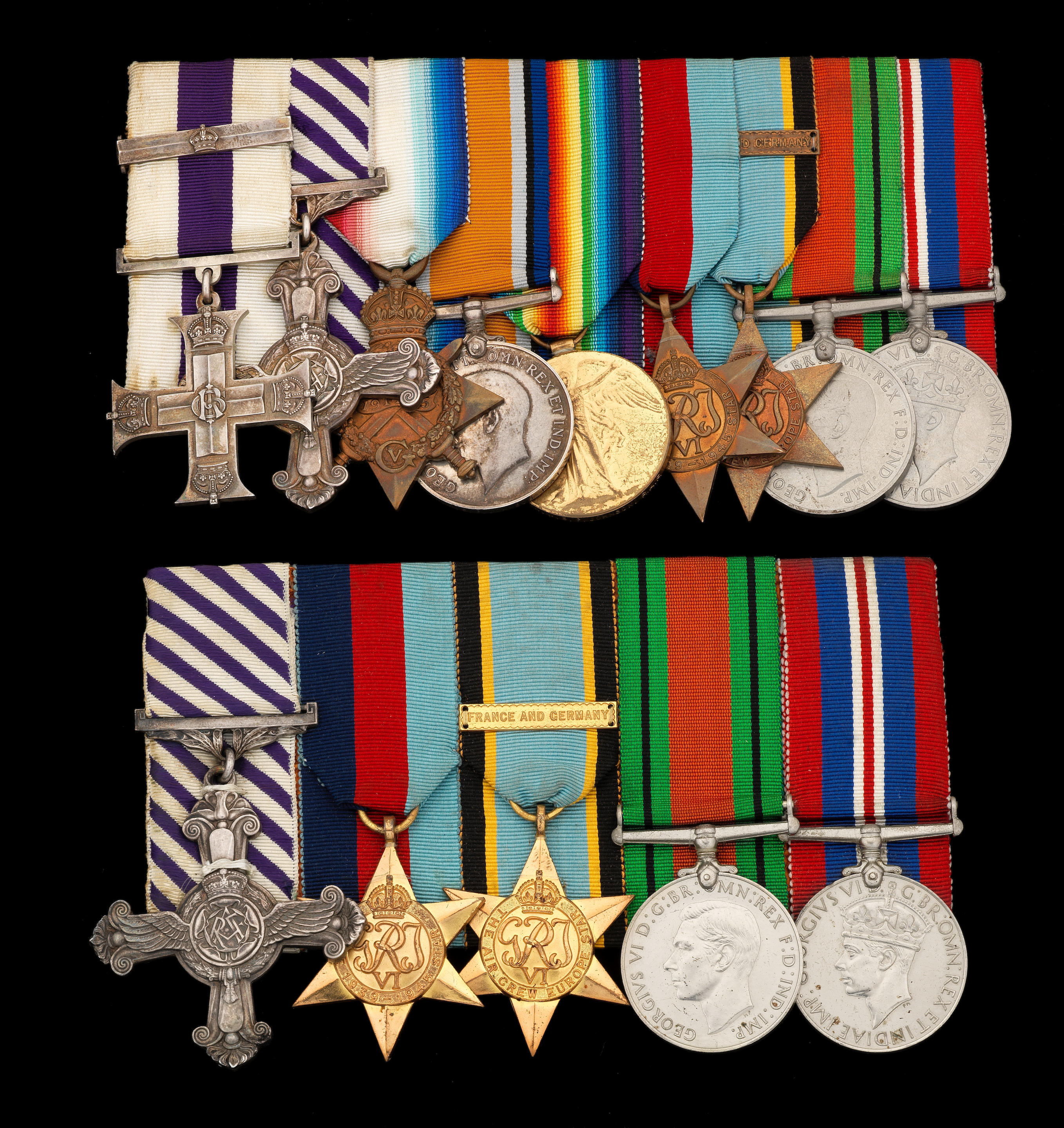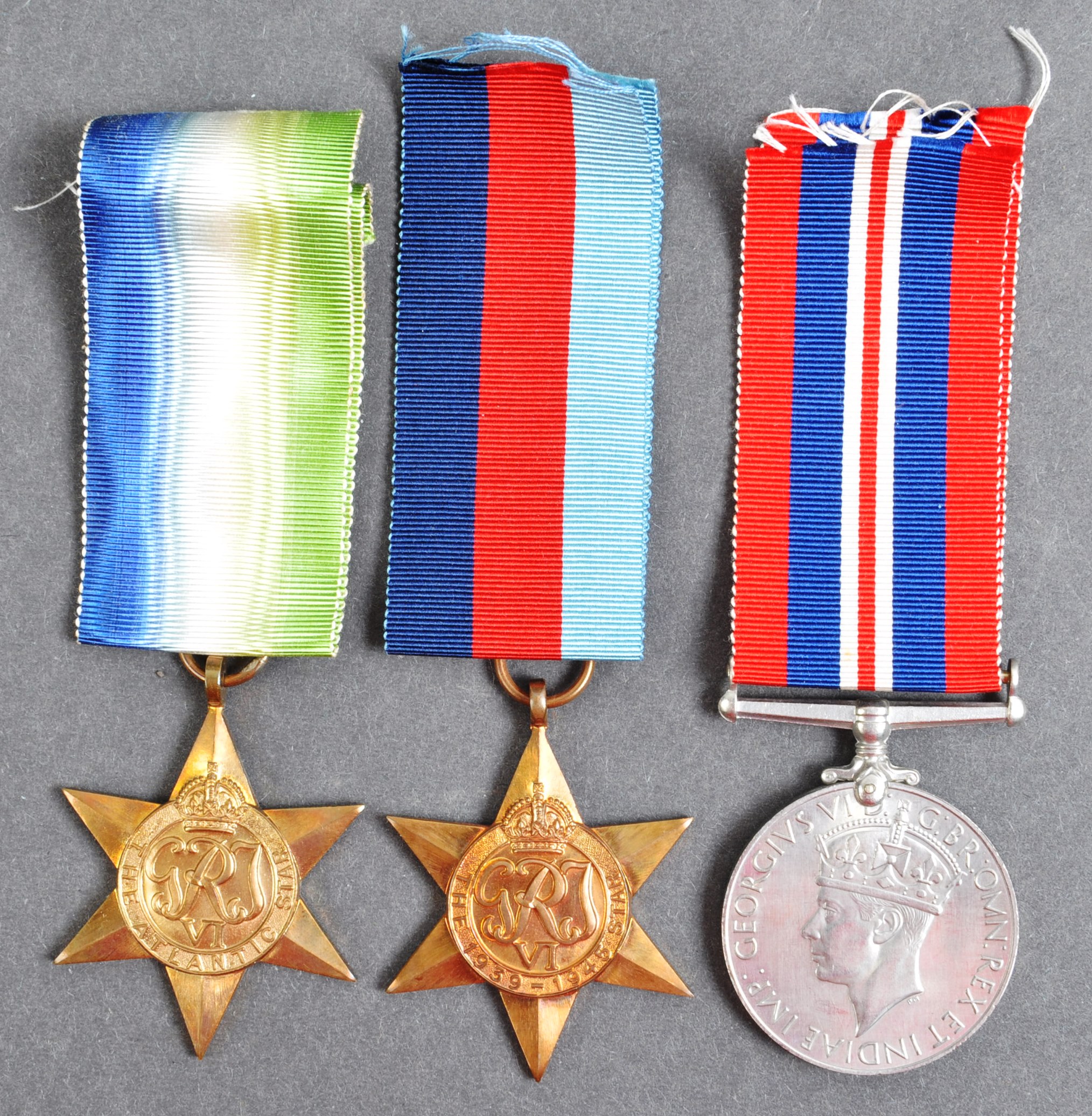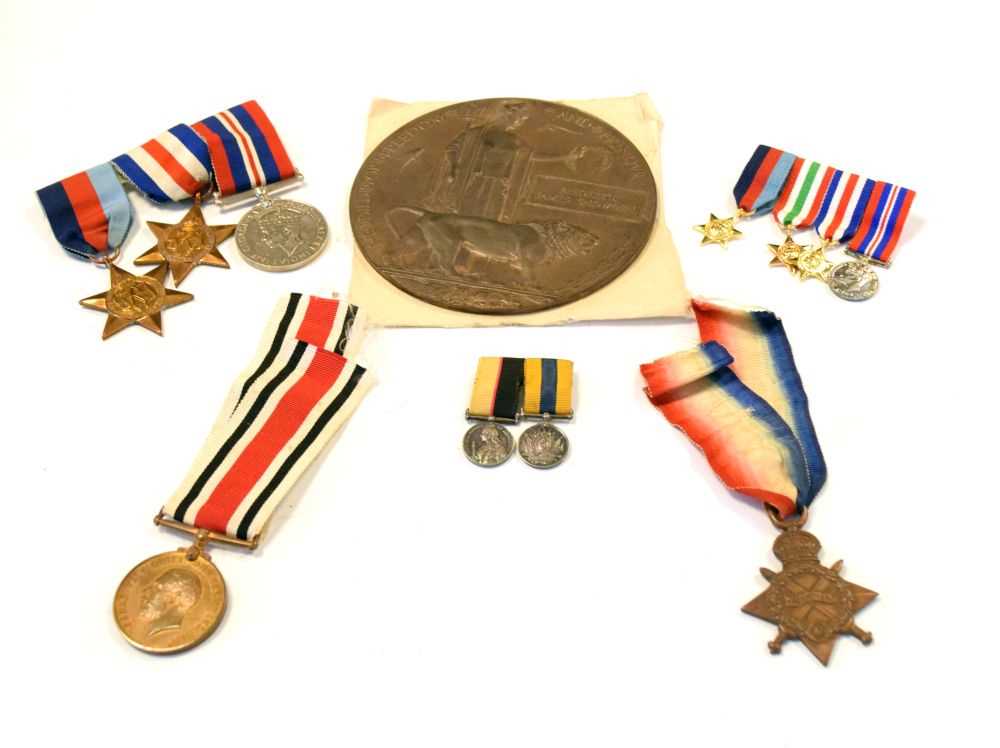A Second World War North-West Europe operations M.C. group of five awarded to Captain H. W. Llewellyn Smith, Scots Guards Military Cross, G.VI.R. reverse officially dated ‘1946’ and privately engraved, ‘Capt. H. W. Llewellyn-Smith, Scot Gds.’; 1939-45 Star; France and Germany Star, these last two privately engraved, ‘Capt. H. W. Llewellyn-Smith, Scot Gds.’; Defence and War Medals, M.I.D. oak leaf, these last two privately engraved, ‘Capt. H. W. Llewellyn-Smith’, mounted as worn, generally good very fine (5) £1000-1200 Footnote M.C. London Gazette 24 January 1946 (North-West Europe). The original recommendation states: ‘Throughout the campaign from Normandy to the Elbe, Captain Smith has been Signal Officer of this Battalion. In this capacity he has had to carry out, over this long period, what is inevitably the most unspectacular but by far the most arduous task in a Tank Battalion, requiring constant and unceasing attention and alertness, under on practically all occasions extremely adverse conditions of weather and enemy fire and action of all kinds. The most outstanding point of the whole operational working of this Battalion throughout the campaign has undoubtedly been the successful maintenance of wireless communications, and the credit for this must go entirely to the magnificently resolute, patient and cheerful way in which this officer has stuck to his duties and dealt successfully with every difficulty encountered, no matter how great.’ Mention in despatches London Gazette 22 March 1945 (also for North-West Europe). Harold Wyatt Llewellyn Smith was educated at Winchester and New College, Oxford, and was a schoolmaster prior to the outbreak of hostilities, when he enlisted in the Scots Guards, aged over 30 years. Commissioned as a 2nd Lieutenant in September 1942, he joined the 3rd (Tank) Battalion, Scots Guards in the following year, was advanced to Lieutenant and, come the Allied invasion in Normandy, was embarked for active service as the unit’s Signal Officer. Major-General J. M. Gow, who served with him during this period, later wrote in a regimental obituary: ‘What I have written does not begin to convey Harold as the really remarkable man he was - in the company of many other outstanding officers in the Battalion. In the first place, he was very much older than his fellow subalterns and he was extremely erudite. I remember trying to catch him out one day, as we were sitting in a Normandy orchard: the truth was that old “Smudger”, as he was irreverently called by some of us, was, I thought, getting a bit above himself, and this time I was sure I had him fixed. “Harold,” I said, “What do you know about the constitution of the State of Andorra?” He stared pensively at me, took his pipe out of his mouth and replied, “Everything. My father wrote a book about it!” And then, characteristically, he chuckled in his usual way. With his impish humour too, he took great delight in his selection by Colonel Charles Dunbar as the officer in charge of the Officers’ Mess at Thoresby Hall, when we knew that he did not care what he ate ... Members of the old 3rd Battalion who read this will remember him as a great character, a forceful personality and a respected friend to all, from the Commanding Officer to the most newly joined Guardsman. Certainly no one could have trained us better in the mysteries of the 19-set and voice procedure. There we sat, evening after evening: a future Cabinet Minister, Moderator, Bishop, Lord Chamberlain, Marshal of the Diplomatic Corps, several chairmen of companies, Lieutenant-General and three Major-Generals, sending out tuning and netting calls, finding zero beat and maximum dip till we were dizzy. I don’t think we would have done it for anyone else but Harold.’ Smith, who attained the rank of Temporary Captain in May 1945, returned to the teaching profession after the War and became Headmaster of Marylebone Grammar School. He was also a valuable contributor to histories of the 3rd (Tank) Battali
A Second World War North-West Europe operations M.C. group of five awarded to Captain H. W. Llewellyn Smith, Scots Guards Military Cross, G.VI.R. reverse officially dated ‘1946’ and privately engraved, ‘Capt. H. W. Llewellyn-Smith, Scot Gds.’; 1939-45 Star; France and Germany Star, these last two privately engraved, ‘Capt. H. W. Llewellyn-Smith, Scot Gds.’; Defence and War Medals, M.I.D. oak leaf, these last two privately engraved, ‘Capt. H. W. Llewellyn-Smith’, mounted as worn, generally good very fine (5) £1000-1200 Footnote M.C. London Gazette 24 January 1946 (North-West Europe). The original recommendation states: ‘Throughout the campaign from Normandy to the Elbe, Captain Smith has been Signal Officer of this Battalion. In this capacity he has had to carry out, over this long period, what is inevitably the most unspectacular but by far the most arduous task in a Tank Battalion, requiring constant and unceasing attention and alertness, under on practically all occasions extremely adverse conditions of weather and enemy fire and action of all kinds. The most outstanding point of the whole operational working of this Battalion throughout the campaign has undoubtedly been the successful maintenance of wireless communications, and the credit for this must go entirely to the magnificently resolute, patient and cheerful way in which this officer has stuck to his duties and dealt successfully with every difficulty encountered, no matter how great.’ Mention in despatches London Gazette 22 March 1945 (also for North-West Europe). Harold Wyatt Llewellyn Smith was educated at Winchester and New College, Oxford, and was a schoolmaster prior to the outbreak of hostilities, when he enlisted in the Scots Guards, aged over 30 years. Commissioned as a 2nd Lieutenant in September 1942, he joined the 3rd (Tank) Battalion, Scots Guards in the following year, was advanced to Lieutenant and, come the Allied invasion in Normandy, was embarked for active service as the unit’s Signal Officer. Major-General J. M. Gow, who served with him during this period, later wrote in a regimental obituary: ‘What I have written does not begin to convey Harold as the really remarkable man he was - in the company of many other outstanding officers in the Battalion. In the first place, he was very much older than his fellow subalterns and he was extremely erudite. I remember trying to catch him out one day, as we were sitting in a Normandy orchard: the truth was that old “Smudger”, as he was irreverently called by some of us, was, I thought, getting a bit above himself, and this time I was sure I had him fixed. “Harold,” I said, “What do you know about the constitution of the State of Andorra?” He stared pensively at me, took his pipe out of his mouth and replied, “Everything. My father wrote a book about it!” And then, characteristically, he chuckled in his usual way. With his impish humour too, he took great delight in his selection by Colonel Charles Dunbar as the officer in charge of the Officers’ Mess at Thoresby Hall, when we knew that he did not care what he ate ... Members of the old 3rd Battalion who read this will remember him as a great character, a forceful personality and a respected friend to all, from the Commanding Officer to the most newly joined Guardsman. Certainly no one could have trained us better in the mysteries of the 19-set and voice procedure. There we sat, evening after evening: a future Cabinet Minister, Moderator, Bishop, Lord Chamberlain, Marshal of the Diplomatic Corps, several chairmen of companies, Lieutenant-General and three Major-Generals, sending out tuning and netting calls, finding zero beat and maximum dip till we were dizzy. I don’t think we would have done it for anyone else but Harold.’ Smith, who attained the rank of Temporary Captain in May 1945, returned to the teaching profession after the War and became Headmaster of Marylebone Grammar School. He was also a valuable contributor to histories of the 3rd (Tank) Battali















Try LotSearch and its premium features for 7 days - without any costs!
Be notified automatically about new items in upcoming auctions.
Create an alert